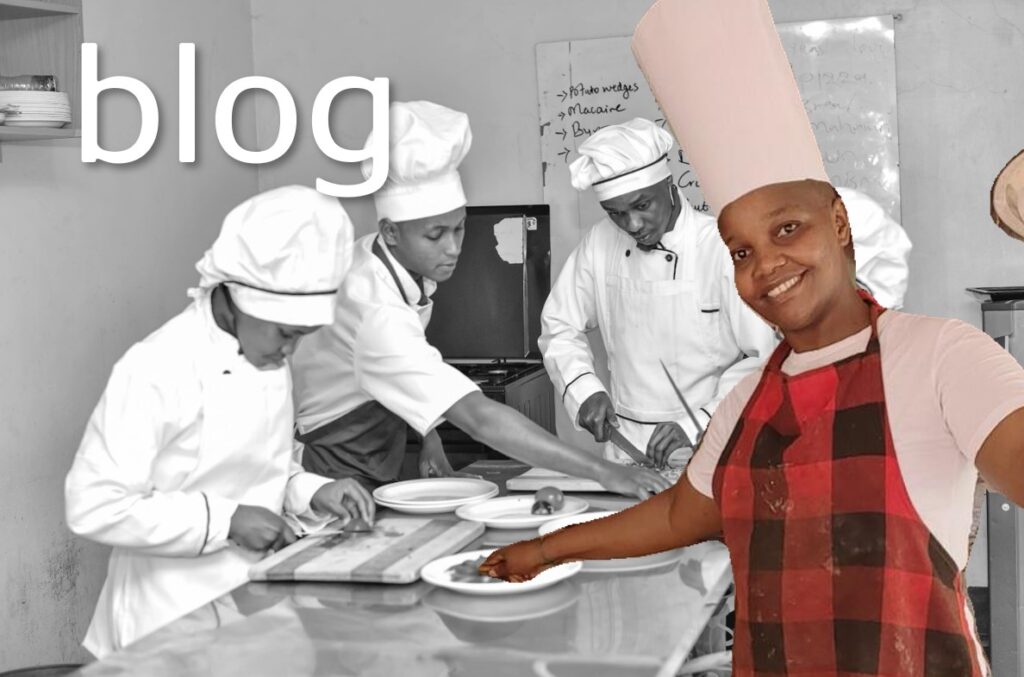Mary Mutua from Kenya has survived the slums, where drugs, crime, and prostitution were a daily companion. She tried to escape all challenges and was hired as a housemaid, where she was ill-treated. Despite all odds, she managed to study hotel management and worked in the hospitality industry and discovered the dark side of it.
There, she noticed the gaps between hospitality training and the reality where marginalized youth are looked down upon. Her dream is to train youth from the slums, using hospitality management as a tool to enable them to explore their dreams to either integrate into or revolutionize the industry.
by Mary Mutua:
Slums, slavery, and social change
“I won’t sit here quietly observing how you waste your life!” My husband defended himself when I found out that he, behind my back, wanted to cancel my scholarship for kanthari, a leadership training program for social change makers.
“Which married woman abandons her family just like that?!” While he was furious out of concern, my nine-year-old daughter stayed cool: “Mummy, go to India. And while you travel to one country, I will later visit five!”
My decision to leave wasn’t solely for my benefit; it was for the youth I aimed to empower through my training centre in the slums. Leadership skills were essential to navigate the challenges my center was facing but I felt ill-equipped to tackle them. I was not sure whether kanthari would be the right place for me, but it was worth trying.
Born and raised in a rural village in Kenya, I successfully went through primary and secondary education. However, my parents could not afford to take me to higher levels. Since my elder sisters were already married after high school, I knew, I was next. I had to face my fate or do something different! At the age of 18, I escaped. Sitting on the bus, I was worried about my future. Going back was not an option! Kibera, the biggest slum in Africa, was my destination.
Escape from Kibera: A Journey to Empowerment
Life in Kibera is not easy. The settlement, overcrowded and under-serviced, hosts most families in windowless 12’ by 12’ shacks, with tin roofs, and dirt floors. Eight or more persons sleep on the bare ground; no toilets, and no drainage systems! This was my new home. Out here, it’s the survival of the fittest.
Soon I made friends. Together, we rented a room. Drugs, commercial sex work, and crime was a way of life for many. The need to earn a livelihood made some of us deliver drugs for lucrative fees. Sometimes others became custodians of stolen items. Life was exciting, until one day, when we had to escape an arrest during a police raid which landed two of our friends in jail. A gun that was used in a robbery was found in a bag that they kept in our room.
I knew it was time to get off this train.
I got a job as a housemaid in an estate outside Kibera. But I felt enslaved and against my boss’ wishes, I sneaked out to learn computer skills. This was a game-changer. Entering into better-paid jobs enabled me to save money for university. Nine years after completing high school, I joined a course in hospitality management.
Challenges in the Hospitality Industry: Bridging the Gap
After graduation, I worked as a manager at Safari Park, a five-star hotel. This allowed me to have a better insight into the hotel industry and its negative perceptions towards young people from the slums. Only after one year, I had enough and resigned as a manager. From then onwards, I volunteered as a trainer in a hospitality school.
Their curriculum to me was rather boring and not relevant. It didn’t expose the trainees to the reality of the industry: long working hours, rude guests, poor working conditions, and little pay. I wanted to provide a sense of reality to enable them to make well-informed choices. My story and my experience would be a motivation to help them achieve their dreams. With all this in mind, I started a hospitality training center.

Two years down the line, we trained over 40 beneficiaries. However, the fact that we are located in the slum, brings challenges. Many could fall back into old habits of drugs crime and prostitution.
Moving the college away is the first step that we intend to take to achieve our vision. This will not only expose the students to another way of living but will also provide an environment that will help them internalize and practice whatever is learned. Our new centre, Twajali (showing concern), will offer a holistic learning approach.
The kanthari Course: A Turning Point
The search for progress and change led me to apply for the kanthari course and I communicated the decision to my husband: “Please, don’t force me to choose between our marriage and my desire for social change, I could very well choose the latter!”
Today, his attitude has shifted as he witnessed my transformation. More than ever, he believes in my dream and has become an active partner in managing the center.
Well, a true kanthari cannot be everybody’s darling! And to make a change, you sometimes need to go against the will of the persons you love most.
Watch Mary’s kanthari TALK here (day One, session 3)
And learn more about Mary’s organisation TWAJALI here
Do you, like Mary, carry a plan for social change? And do you want to start your own impactmaking organisation?
Then check out the kanthari website and apply today, to become a participant in the next course that starts in April 2024.
Apply via www.kanthari.org



